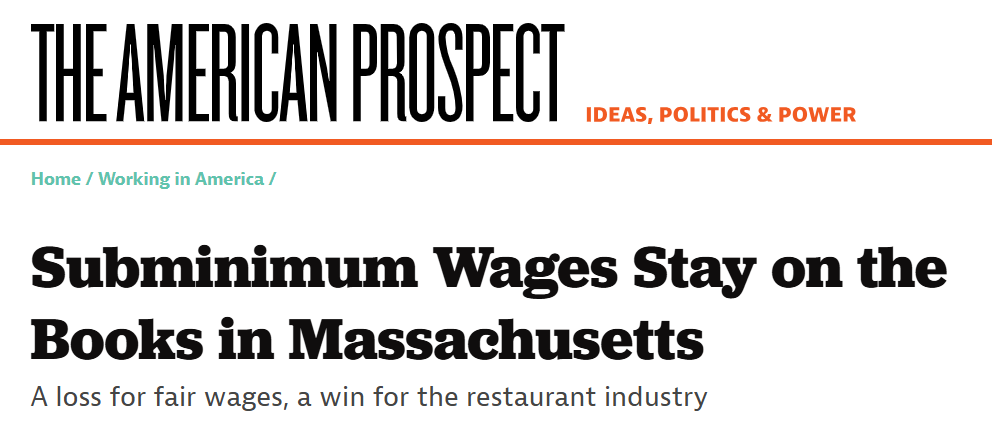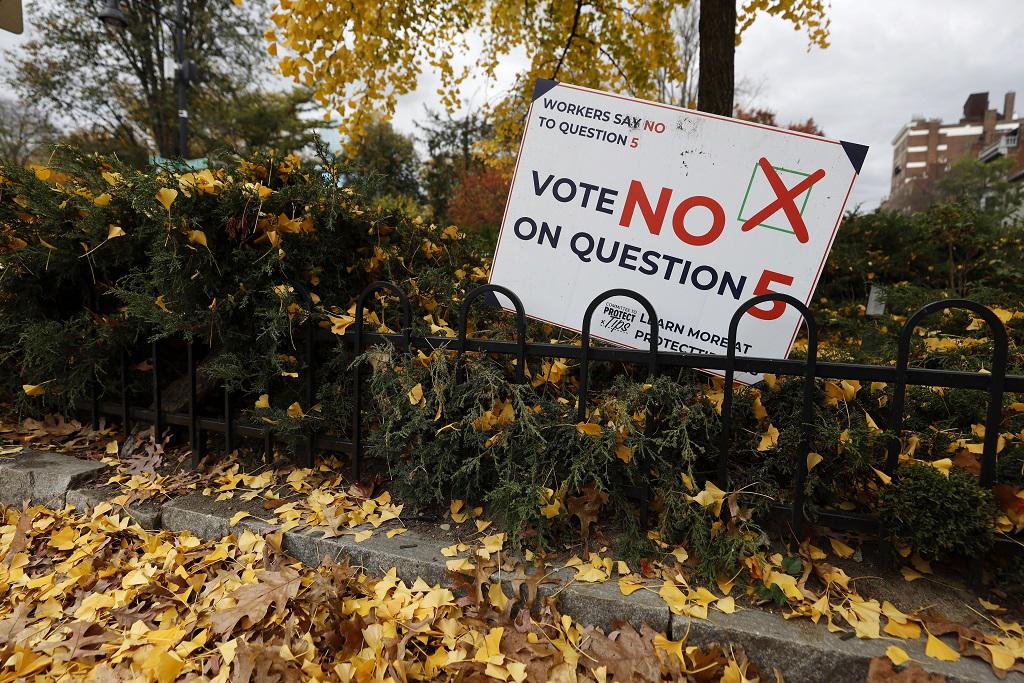Welcome to DU!
The truly grassroots left-of-center political community where regular people, not algorithms, drive the discussions and set the standards.
Join the community:
Create a free account
Support DU (and get rid of ads!):
Become a Star Member
Latest Breaking News
Editorials & Other Articles
General Discussion
The DU Lounge
All Forums
Issue Forums
Culture Forums
Alliance Forums
Region Forums
Support Forums
Help & Search
Massachusetts
Related: About this forumSubminimum Wages Stay on the Books in Massachusetts

https://prospect.org/labor/2024-12-06-subminimum-wages-stay-on-books-massachusetts/

In 2018, Massachusetts state lawmakers came up with a “grand bargain” to raise pay rates for tipped workers, servers, bartenders, and others. Over a five-year period, beginning in 2019, the law steadily raised the $4.35-per-hour tipped minimum wage 60 cents each year until the rate reached $6.75 per hour in 2023. Last year, the Bay State raised the minimum wage for non-tipped workers to $15 per hour. This year, the Question 5 ballot initiative proposed doing the same for tipped workers who would still be able to earn tips along with that increase. Over the next five years, the minimum wage would be raised and, additionally, all tips would be pooled and split with nonmanagerial restaurant staff, even those who do not directly interact with customers. On November 5, voters delivered a resounding “no” on Question 5. Only 36 percent of voters supported the initiative, while 64 percent voted against it. It was undoubtedly a disappointing outcome for some, but who exactly was disappointed?
Certainly, the group behind the ballot initiative, One Fair Wage (OFW), a workers’ rights organization based in New York City that works to end subminimum wages for restaurant workers nationwide, was let down by the vote. OFW president Saru Jayaraman said in a statement that the group was up against “millions of dollars in corporate influence, false claims and fear tactics.” The group argued that implementing the higher wage would create a more stable income for servers and reduce sexual harassment in the industry, and vowed to pursue “legislative action and/or future ballot measures.” The Massachusetts Restaurant Association and Massachusetts Restaurants United and other opponents spent about $3 million campaigning against the initiative. Stephen Clark, the president of the Massachusetts Restaurant Association, had claimed that this proposal would “impact the restaurant owner, who’s going to have higher costs upwards of $18,000 dollars per tip employee to implement this, and it’s going to have a higher cost for the consumer because there’s going to be higher costs.”
Two Massachusetts universities had released separate studies on the ballot initiative—and both studies independently concluded that passing the ballot measure would result in higher wages for tipped workers. In their October report, Jeannette Wicks-Lim, a research professor at the University of Massachusetts Amherst’s Political Economy Research Institute (PERI), and Jasmine Kerrissey, the director of the UMass Labor Center, found that food service employees would likely see between a 10 percent and 20 percent increase in wages. Similarly, Evan Horowitz, the director of the Center for State Policy Analysis (cSPA), found in his September study that employees would see an increase in wages. Additionally, the UMass researchers found that the proposal would cost restaurants just 2 percent of their annual revenues, debunking a claim that this measure would drive independent restaurants out of business. Horowitz’s research echoed these findings, stating that restaurants would increase their prices to adjust for increased wage costs.
Restaurant customers’ concerns surrounding potential price increases also contributed to negative views about Question 5. Wicks-Lim of PERI also noted that the ballot measure opponents stoked fears that there would be significant layoffs, as small local restaurants simply could not afford to pay the wage increase. So why did restaurant workers vote against their own interests? Horowitz believed that many food service workers voted no because Question 5 proposed pooling and splitting tips. Many food service workers deliver service with the expectation of receiving a tip reflecting the quality of their performance—an incentive for them to improve their customer service skills to increase their wages. However, if tips are pooled and split with workers who do not interact with customers, there may be less of an incentive to provide exceptional service. Tips, of course, make up the majority of tip-eligible food service workers’ income, but many workers were skeptical about the projected increases and those doubts doomed the initiative.
snip
1 replies
 = new reply since forum marked as read
Highlight:
NoneDon't highlight anything
5 newestHighlight 5 most recent replies
= new reply since forum marked as read
Highlight:
NoneDon't highlight anything
5 newestHighlight 5 most recent replies
Subminimum Wages Stay on the Books in Massachusetts (Original Post)
Celerity
Dec 2024
OP
getagrip_already
(17,761 posts)1. Not mentioned - this bill pooled tips with white collar staff
Eligible for tip pooling under this bill were book keepers and other non management staff like them.
That opened the door for all kinds of family and friends to suddenly share in tips they absolutely did not deserve.
Im all for a fair minimum wage for workers. I dont think building in wage theft is fair.